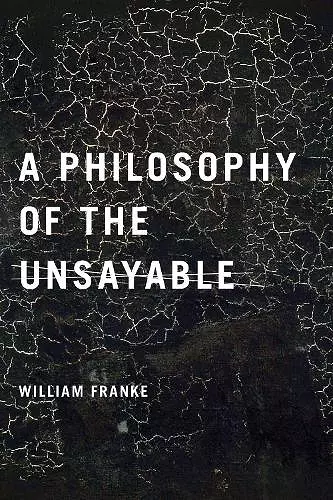A Philosophy of the Unsayable
Format:Paperback
Publisher:University of Notre Dame Press
Published:30th Mar '14
Currently unavailable, and unfortunately no date known when it will be back

In A Philosophy of the Unsayable, William Franke argues that the encounter with what exceeds speech has become the crucial philosophical issue of our time. He proposes an original philosophy pivoting on analysis of the limits of language. The book also offers readings of literary texts as poetically performing the philosophical principles it expounds. Franke engages with philosophical theologies and philosophies of religion in the debate over negative theology and shows how apophaticism infiltrates the thinking even of those who attempt to deny or delimit it.
In six cohesive essays, Franke explores fundamental aspects of unsayability. In the first and third essays, his philosophical argument is carried through with acute attention to modes of unsayability that are revealed best by literary works, particularly by negativities of poetic language in the oeuvres of Paul Celan and Edmond Jabès. Franke engages in critical discussion of apophatic currents of philosophy both ancient and modern, focusing on Hegel and French post-Hegelianism in his second essay and on Neoplatonism in his fourth essay. He treats Neoplatonic apophatics especially as found in Damascius and as illuminated by postmodern thought, particularly Jean-Luc Nancy’s deconstruction of Christianity. In the last two essays, Franke treats the tension between two contemporary approaches to philosophy of religion—Radical Orthodoxy and radically secular or Death-of-God theologies. A Philosophy of the Unsayable will interest scholars and students of philosophy, literature, religion, and the humanities. This book develops Franke's explicit theory of unsayability, which is informed by his long-standing engagement with major representatives of apophatic thought in the Western tradition.
"William Franke has emerged as our foremost purveyor of what cannot be said. . . . We should be grateful for this extended articulation, since it also informs us why the unsayable must be said. . . . Given its breadth—the range of thinkers and thought that is covered—and its challenge—to keep open ‘conscious human reflection that refuses to be cut off from the mystery of its ground’—this is a remarkable text, and deserves close attention at every level." —Literature & Theology
"Strongly reflecting academic debates of the last thirty years, Franke's book is not quite a research monograph and not quite a course book but a thoughtful, provoking and often helpful exploration of an intellectually and spiritually demanding discourse." —Theology
"William Franke is an eminent scholar in comparative literature, who is schooled in philosophy and religion. He is recognized as one of the most creative contemporary thinkers working at the double intersection of philosophy and literature and philosophy and theology. A Philosophy of the Unsayable shows an intellectual grasp of a dizzying array of discourses and sheds real light on all thinkers who are discussed." —Cyril O'Regan, Huisking Professor of Theology, University of Notre Dame
"By now, it would seem that there could be no more to say about not-saying. Apophatic language and negative theology have been accused of meaninglessness, nihilism, and even ill-concealed ontologies. In this lovely and surprising book, William Franke not only deftly undoes these criticisms but shows that apophasis underlies and strangely grounds all language and thought, even of those very discourses that most vigorously reject it. A Philosophy of the Unsayable demonstrates with elegance that there is indeed more to say, and more that is both meaningful and important." — Karmen MacKendrick, Le Moyne College
"William Franke is an articulate spokesman for what cannot be said not only with regards to modern European poetry but also with respect to contemporary theology. A Philosophy of the Unsayable is essential reading for everyone working in religion and literature and in modern theology." —Kevin Hart, Edwin B. Kyle Professor of Christian Studies, University of Virginia
ISBN: 9780268028947
Dimensions: 229mm x 152mm x 21mm
Weight: 526g
392 pages